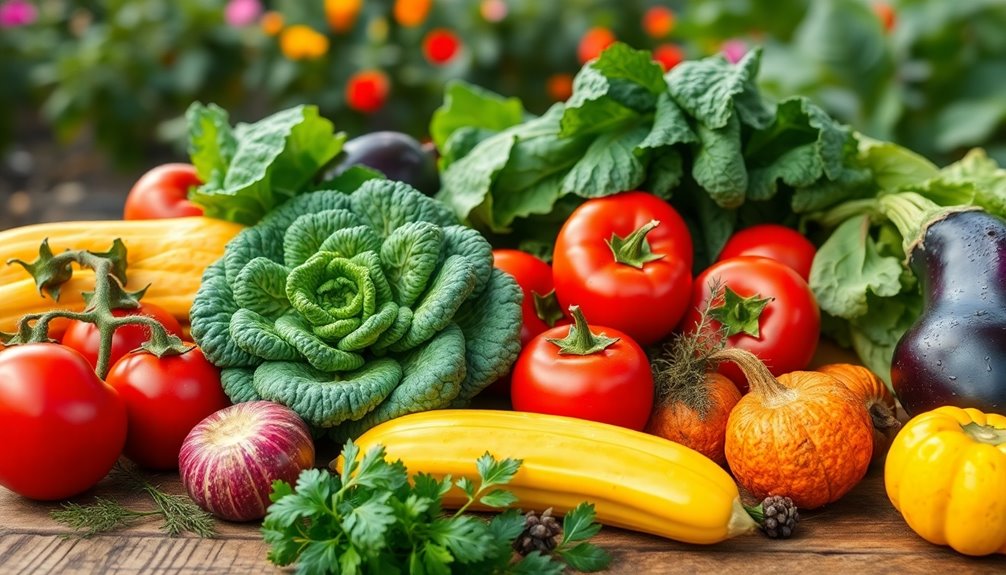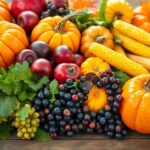Eating seasonal produce boosts your health by providing fruits and vegetables at their peak ripeness, which maximizes nutrient content. This means you get higher levels of vitamins, minerals, and antioxidants essential for immune support and chronic disease prevention. Fresh seasonal foods are also rich in fiber, aiding digestion. Choosing locally-grown options not only enhances taste, but it's often more cost-effective as well. Plus, supporting local farmers promotes sustainability. You'll enjoy variety in flavors and colors with each season's bounty, making your meals exciting. If you're curious about how to incorporate more seasonal foods, there's plenty more to explore.
Key Takeaways
- Seasonal produce is harvested at peak ripeness, maximizing its nutrient content, which is essential for overall health.
- Fresh fruits and vegetables provide higher levels of fiber, aiding digestion and promoting gut health.
- Eating seasonal foods boosts immunity by offering a variety of vitamins, minerals, and antioxidants.
- Locally grown seasonal produce is often fresher, leading to better taste and higher nutritional value compared to imported items.
- Consuming nutrient-dense seasonal foods can reduce the risk of chronic diseases, contributing to long-term health benefits.
Nutritional Advantages of Seasonal Produce
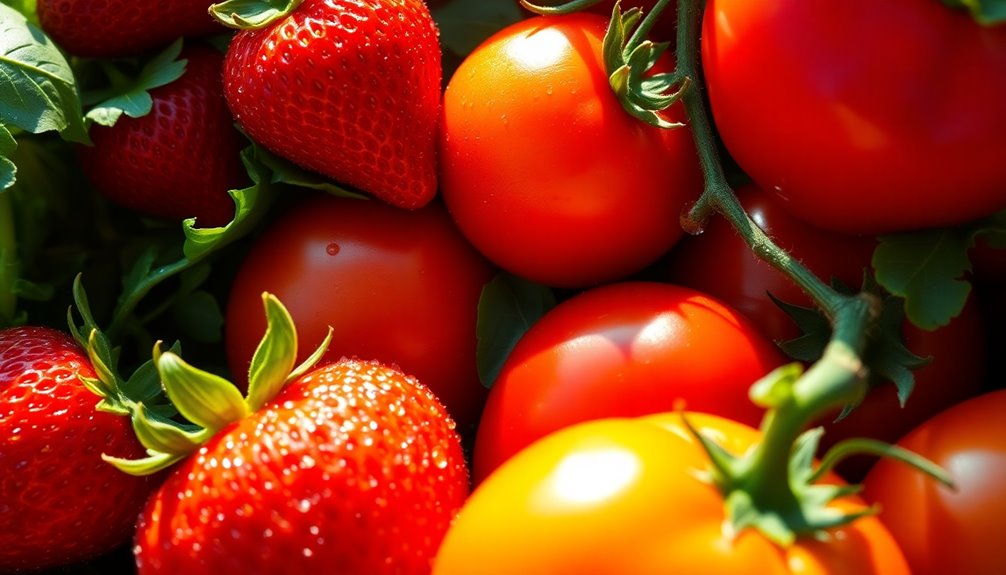
When you select seasonal produce, you're not just savoring fresh flavors; you're also reaping significant nutritional advantages. Seasonal fruits and vegetables are harvested at their peak, which means they often have higher levels of vitamins, minerals, and antioxidants. These nutrients are essential for maintaining your overall health and can help reduce the risk of chronic diseases.
The dietary benefits of consuming seasonal produce extend beyond just nutrition. When you consume what's in season, you're likely getting more fiber, which aids digestion and keeps you feeling satisfied longer. This can support your weight management efforts and promote a healthier lifestyle.
Additionally, seasonal fruits and vegetables are typically cultivated in local environments, allowing them to ripen naturally and develop more robust nutrient profiles.
The health advantages are further heightened by the fact that seasonal produce tends to be more affordable and environmentally friendly. When you purchase local, you not only support your community but also reduce your carbon footprint. Plus, seasonal items often contain fewer preservatives, ensuring you're consuming whole, nutritious foods.
Incorporating seasonal produce into your diet can be a simple yet impactful way to enhance your nutrition. By making mindful choices and embracing what's fresh and local, you're not only nourishing your body but also connecting with your community and the rhythms of nature.
Enhanced Flavor and Freshness
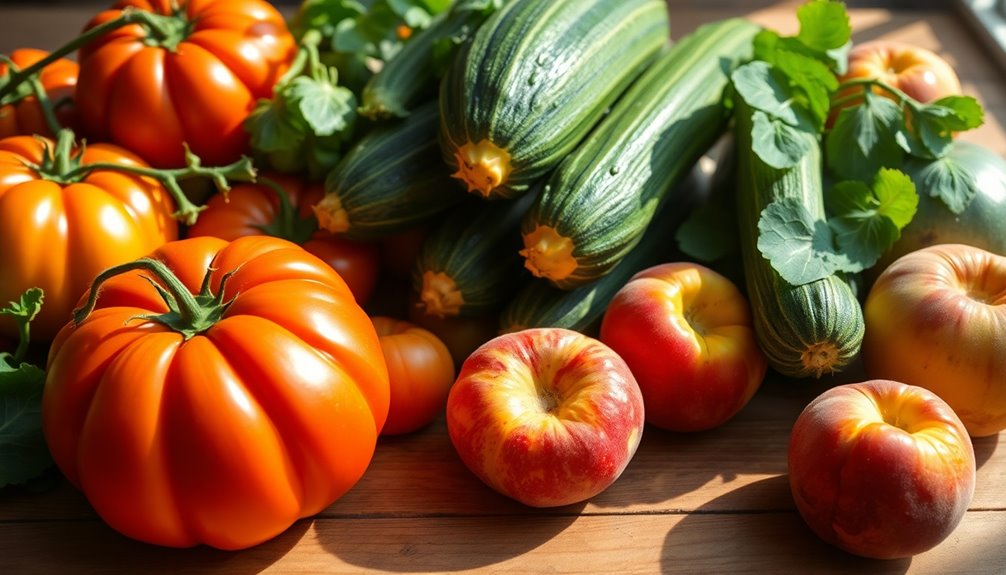
Choosing seasonal produce not only enhances your meals but also elevates the overall eating experience with its unmatched flavor and freshness. When you opt for fruits and vegetables that are in season, you're likely to notice a significant difference in taste. Seasonal produce is harvested at its peak, allowing it to develop full flavor profiles that simply can't be matched by out-of-season alternatives. This is especially important if you have specific taste preferences; fresh, ripe ingredients can transform a simple dish into something truly memorable.
Moreover, incorporating seasonal items into your meals can ignite your culinary creativity. With a rotating selection of produce throughout the year, you're encouraged to experiment with new recipes and flavors. You might find yourself inspired to create vibrant salads with fresh greens in the spring or hearty soups filled with root vegetables in the fall. This variety not only keeps your meals exciting but also allows you to discover new favorites and develop a deeper connection to the food you eat.
Additionally, the freshness of seasonal produce means you're likely consuming items that haven't been stored for long periods. This not only boosts flavor but also guarantees you're getting the best possible nutrients. By selecting seasonal ingredients, you're not just enhancing your meals; you're also enriching your culinary journey, creating a sense of belonging in your kitchen, and fostering a deeper appreciation for the food that nourishes you. Furthermore, seasonal produce often aligns with a plant-based diet, providing essential vitamins and nutrients for optimal health.
Supporting Local Farmers
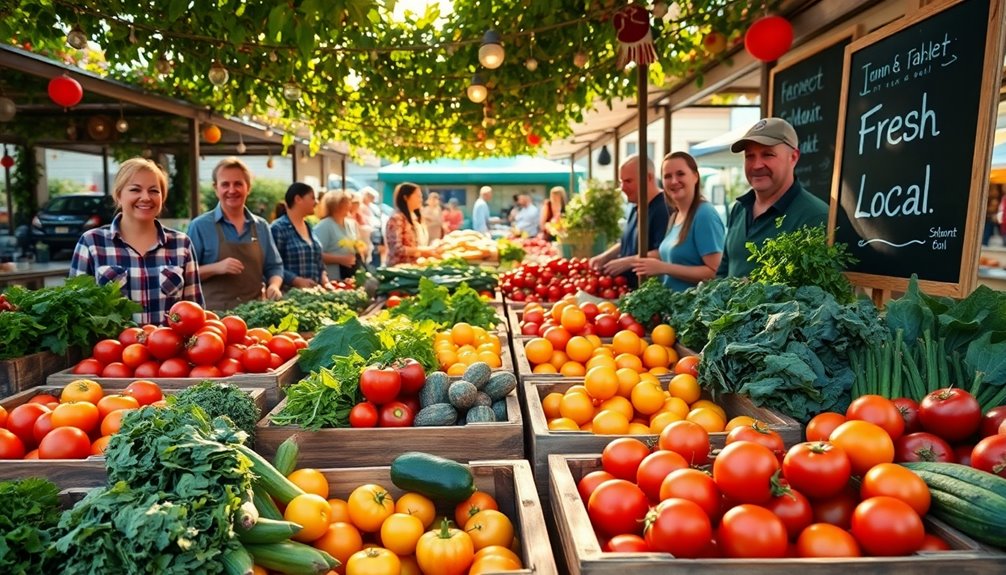
How can supporting local farmers benefit not just your health, but also your community? When you choose to purchase seasonal produce from local farmers, you're not just getting fresher, tastier food; you're actively engaging with your community and fostering strong farmer relationships. These connections create a sense of belonging and trust, as you get to know the people who cultivate your food.
The economic impact of supporting local agriculture is significant. By buying directly from farmers at farmers' markets or local stores, you're ensuring that more money stays within your community. This market support helps sustain local farms, ensuring they can continue to provide fresh produce and contribute to the local economy.
When farmers thrive, they can invest in better practices, hire local workers, and boost the overall economic health of the area. Additionally, purchasing seasonal produce allows you to enjoy the benefits of a tailored meal plan that highlights the freshest ingredients available in your region.
Moreover, your support helps to promote community engagement. Local farms often host events, workshops, and volunteer opportunities that enhance connections among community members. By participating in these activities, you not only make a positive impact on the local economy but also contribute to building a vibrant community where everyone feels valued.
In essence, when you support local farmers, you're making a conscious choice that benefits your health, strengthens community ties, and stimulates economic growth. So, next time you're shopping for groceries, remember that your choices can ripple outwards, enriching not just your life but the lives of those around you.
Environmental Benefits
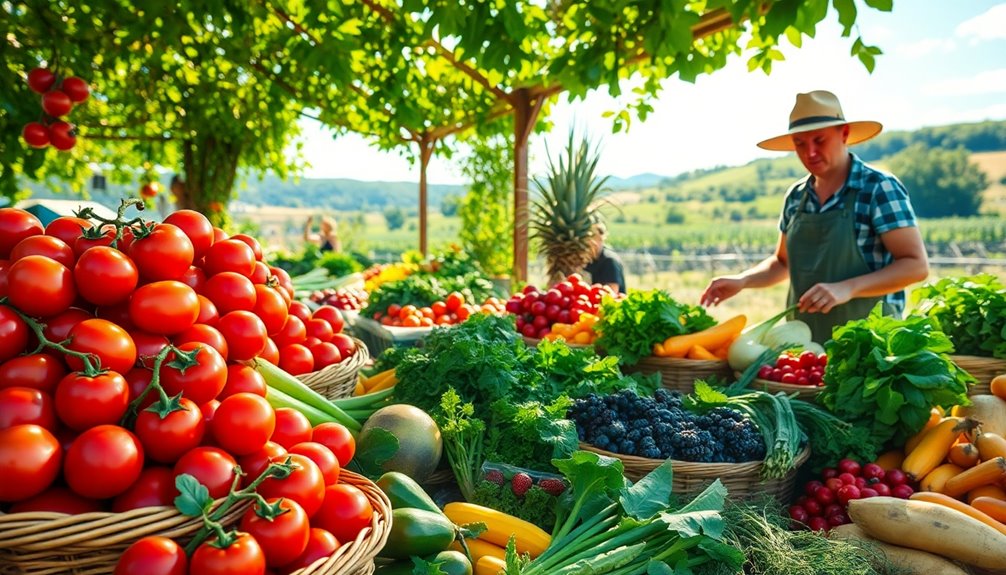
Eating seasonal produce from local farmers offers remarkable environmental benefits that extend beyond individual health. When you choose fruits and vegetables that are in season, you're supporting a system that prioritizes sustainability. Seasonal produce is often grown closer to home, which reduces the carbon footprint associated with transportation. This means less fuel consumption and fewer greenhouse gas emissions, helping to combat climate change.
Moreover, by buying seasonal, you're helping to minimize waste. Many farmers grow produce specifically for peak seasons, which means they're more likely to harvest and sell what's in abundance. This practice leads to a decrease in surplus crops that often end up in landfills. By consuming what's readily available, you contribute to a cycle of reducing waste and promoting a healthier ecosystem.
You'll also find that seasonal fruits and vegetables are typically grown without the extensive use of artificial preservatives and pesticides, as they don't need to be shipped long distances. This practice supports biodiversity and healthier soil, enhancing the sustainability benefits of local farming. Additionally, incorporating seasonal produce into your diet can lead to improved core strength and overall fitness, as it supports a holistic approach to health.
In participating in seasonal eating, you connect with your community and the environment in meaningful ways. You not only nourish your body but also foster a sense of belonging to a movement that prioritizes the planet's health. So, the next time you're at a market, remember that your choices can create a ripple effect, promoting a sustainable future for all.
Cost-Effectiveness of Seasonal Eating

Seasonal eating not only benefits the environment but can also impact your wallet to a large extent. When you choose to consume fruits and vegetables that are in season, you're likely to find budget-friendly options that won't break the bank. Seasonal produce is typically harvested at its peak, which means it's fresher and often less expensive than out-of-season alternatives that may have traveled great distances to reach your grocery store.
The economic impact of seasonal eating goes beyond personal savings. Supporting local farmers who grow seasonal crops contributes to your community's economy and can help sustain local agriculture. By purchasing directly from farmers' markets or community-supported agriculture (CSA) programs, you can also enjoy fresher produce while minimizing transportation costs that often inflate prices.
Moreover, growing seasons vary by region, so when you eat what's in season in your area, you're more likely to get the best deals. This not only helps your budget but also fosters a sense of community as you engage with local growers and other consumers who share your interest in fresh, nutritious food. Additionally, increasing oxygen intake through seasonal produce consumption can enhance your overall health and metabolism, contributing to your weight loss efforts.
Incorporating seasonal produce into your meals can be a delicious way to save money while enjoying the flavors of each season. So, embrace the rhythm of nature, and watch how these small choices can lead to significant savings and a positive economic impact on your community. Eating seasonal doesn't just nourish your body—it's a smart financial decision too.
Seasonal Eating and Food Variety
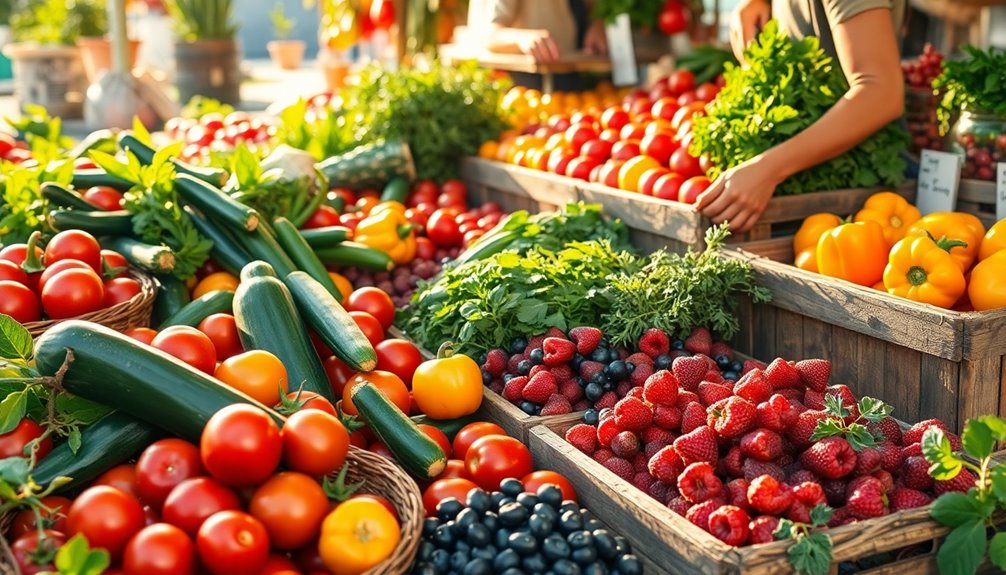
A varied diet is crucial for maintaining optimal health, and seasonal eating can greatly enhance the variety of fruits and vegetables you incorporate into your meals. When you choose to eat what's in season, you're not just benefiting your health but also your taste buds. Seasonal produce often offers peak flavor and nutrients, making your meals more satisfying.
By embracing seasonal eating, you open up a world of culinary creativity. Each season brings a unique array of fruits and vegetables, allowing you to experiment with new recipes and cooking techniques. Imagine the joy of discovering vibrant spring asparagus, ripe summer tomatoes, hearty fall squash, or sweet winter citrus. These seasonal ingredients inspire you to try new dishes and flavors, promoting a sense of taste exploration that can enliven your kitchen routine.
Moreover, incorporating a variety of seasonal produce helps guarantee you receive a broad spectrum of nutrients, which is key for overall health. Different fruits and vegetables offer distinct vitamins, minerals, and antioxidants, contributing to a well-rounded diet. This is especially important as your body needs different nutrients throughout the year. As noted in studies, embracing natural calorie cycles can also help enhance metabolism and overall well-being.
Seasonal eating encourages connection with local farmers and markets, fostering a sense of community and shared experience. You'll find that discussing your favorite seasonal finds with friends and family not only enriches your meals but also strengthens your bonds. In embracing seasonal eating, you're not just nourishing your body; you're celebrating the diversity of nature and the joy of cooking together.
Connection to Nature
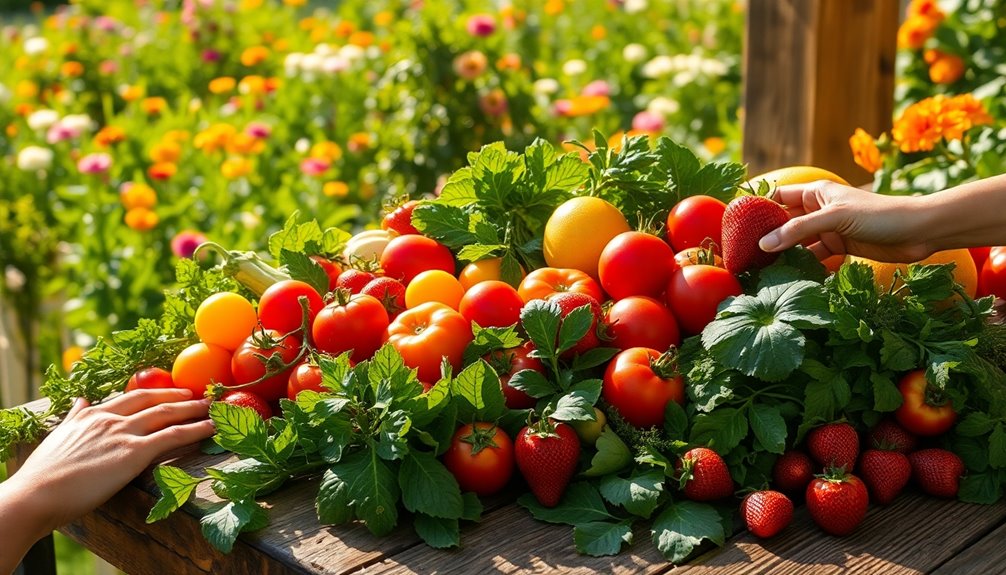
Engaging with seasonal produce deepens your connection to nature and the cycles of life. When you choose fruits and vegetables that are in season, you're not just enjoying fresh flavors; you're also participating in a natural rhythm that aligns your eating habits with the environment. This practice can enhance your mental well-being, as it encourages mindfulness and appreciation for the natural world around you.
Eating seasonally allows you to experience the full spectrum of nature's offerings throughout the year. The vibrant colors and diverse flavors reflect the changing seasons, reminding you of the beauty and variety that the earth provides. This awareness fosters a sense of belonging, as you become more attuned to your local ecosystem and community.
Additionally, embracing seasonal produce supports sustainability benefits. By consuming foods that are in season, you reduce the carbon footprint associated with transporting out-of-season fruits and vegetables from distant locations. This not only helps the environment but also supports local farmers and economies, creating a sense of community interconnectedness. Moreover, focusing on whole foods can lead to a reduction in oxidized cholesterol levels, which is crucial for maintaining heart health.
Incorporating seasonal eating into your lifestyle fosters a deeper relationship with nature and encourages healthier choices. You'll find that your meals become more vibrant and diverse, nourishing both your body and soul. As you cultivate this connection, you'll likely notice an improvement in your overall well-being, further reinforcing the importance of aligning your eating habits with the natural world.
Improved Digestive Health
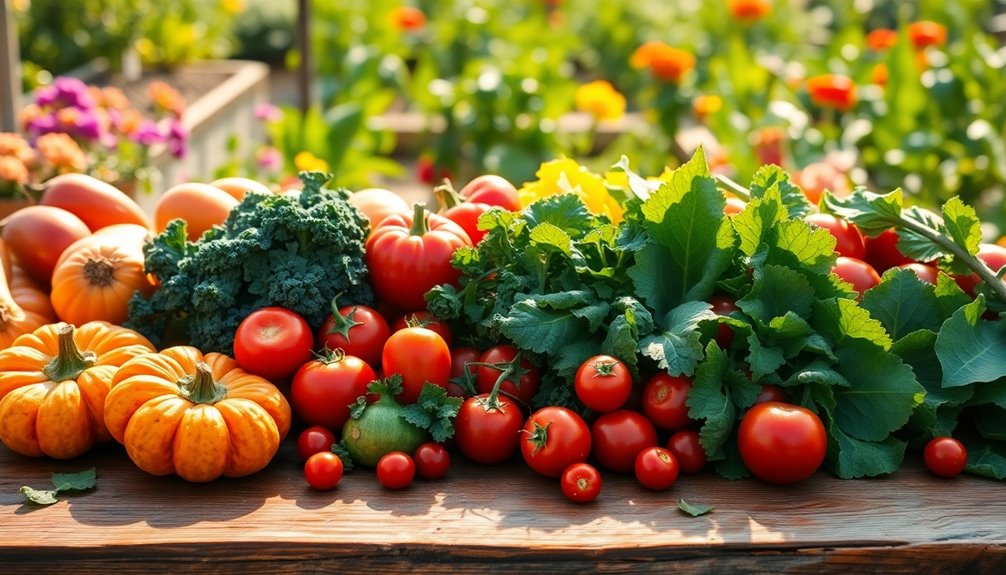
Fresh fruits and vegetables, when consumed in their peak season, can greatly enhance your digestive health. Eating seasonal produce not only ensures you're getting the freshest and most nutrient-dense options, but it also provides specific digestive benefits that can improve your overall gut health.
Here are three key digestive benefits of seasonal produce:
- Higher Fiber Content: Seasonal fruits and vegetables are often picked at their peak ripeness, meaning they contain higher levels of dietary fiber. Fiber plays an important role in maintaining regular bowel movements and promoting a healthy gut microbiome.
- Natural Enzymes: Many seasonal fruits and vegetables contain natural enzymes that aid in breaking down food more efficiently. This can help reduce bloating and discomfort, making your meals more enjoyable and your digestion smoother.
- Hydration: Seasonal produce, especially fruits like watermelon and cucumbers, have high water content. Staying hydrated is essential for optimal digestion, as it helps soften stool and prevents constipation. Additionally, consuming seasonal produce can be a key factor in overcoming alcohol addiction, as the nutrients from fresh fruits and vegetables support overall health and well-being.
Boosting Immunity
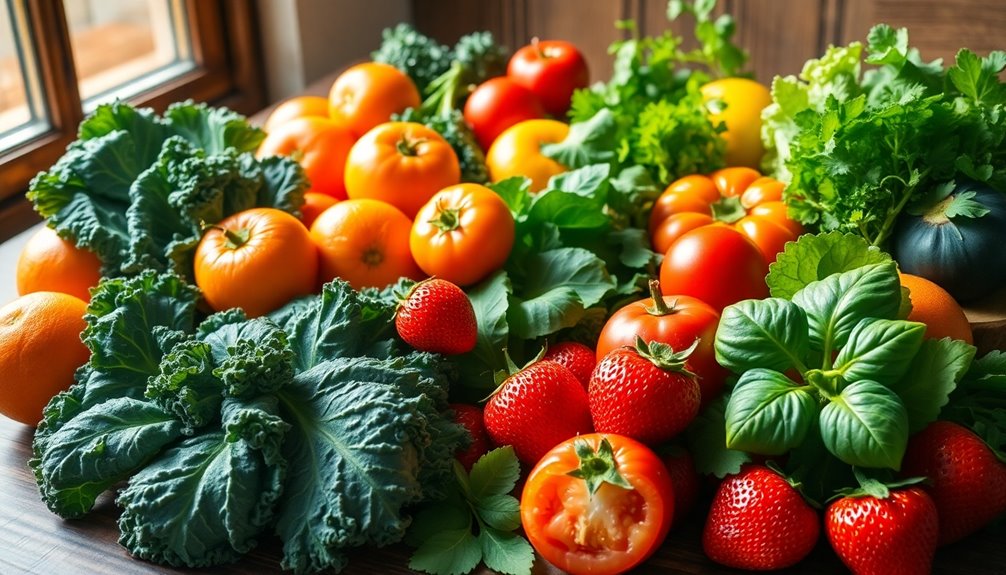
Eating seasonal produce isn't just a treat for your taste buds; it can also be a powerful ally in boosting your immunity. When you choose fruits and vegetables that are in season, you're often getting them at their peak ripeness and nutrient density. This means they're packed with vitamins, minerals, and, importantly, antioxidants. These compounds play an essential role in supporting your immune system by fighting off free radicals and reducing inflammation.
Incorporating a variety of seasonal produce into your meals can lead to an immune system boost. For instance, citrus fruits like oranges and grapefruits, which are abundant in winter, are rich in vitamin C—an essential nutrient known for its immune-enhancing properties.
Similarly, leafy greens, which thrive in the spring, provide an excellent source of vitamins A and K, both vital for maintaining optimal immune function. Additionally, consuming seasonal produce can also help maintain a healthy liver, as the liver plays a critical role in filtering toxins and stabilizing blood sugar levels, which are important for overall health and reducing inflammation.
Cooking With Seasonal Ingredients
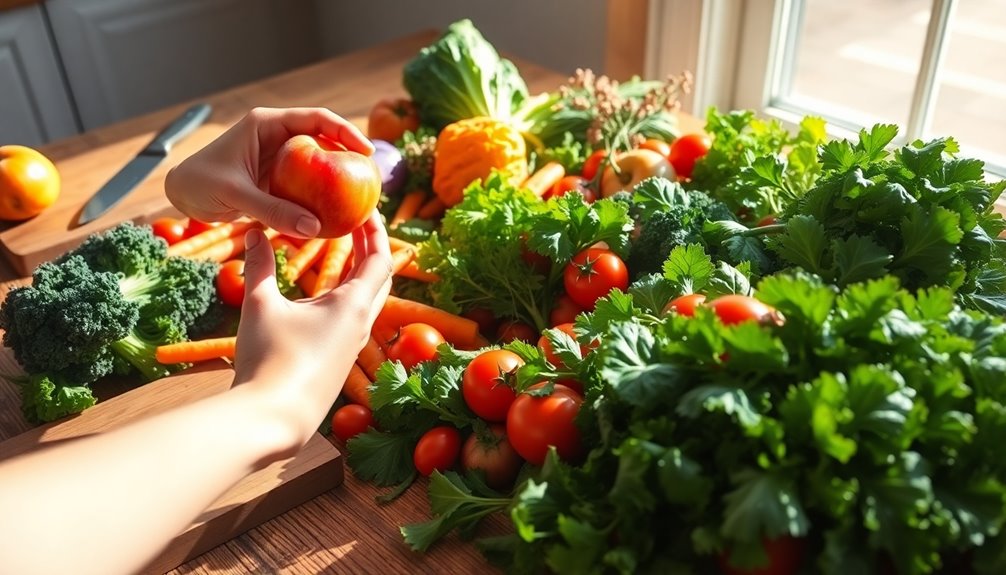
Cooking with seasonal ingredients not only enhances the flavor of your meals but also aligns with a more sustainable lifestyle. By choosing to cook with what's in season, you're not just nourishing yourself, but you're also supporting local farmers and reducing your carbon footprint. Seasonal recipes often showcase the freshest produce, resulting in vibrant dishes bursting with flavor. Here are a few reasons to embrace cooking with seasonal ingredients:
- Maximized Flavor: Seasonal produce is often picked at its peak ripeness, making it more flavorful and nutrient-dense. You'll notice the difference in taste when you use fresh tomatoes in summer or sweet squash in fall.
- Cost-Effective: When you choose seasonal ingredients, you're likely to find them on sale at local markets. This can help reduce your grocery bills and allow you to experiment with new dishes that you mightn't have considered before.
- Ingredient Swaps: Cooking seasonally encourages creativity in the kitchen. If a recipe calls for an out-of-season ingredient, you can often find a suitable seasonal replacement. For example, if a dish requires zucchini, you might swap it with fresh asparagus in spring.
Embracing seasonal cooking fosters a sense of community and belonging. You'll connect with local farmers and fellow food lovers, sharing recipes and ideas that celebrate the bounty of each season. Additionally, incorporating lifestyle changes can greatly enhance your overall health, especially for individuals at risk for conditions like Chronic Kidney Disease.
Frequently Asked Questions
How Can I Identify Seasonal Produce in My Area?
To identify seasonal produce in your area, check local farmers markets and grocery stores. They often highlight what's fresh and in season.
Pay attention to your local climate and growing seasons; different regions have varied harvest times.
You can also research online or ask local farmers for advice. Joining community groups focused on sustainable eating can help you connect with others who share your interest in seasonal foods, making it easier to learn and enjoy.
Are There Specific Seasonal Fruits and Vegetables for Each Month?
Yes, there are specific seasonal fruits and vegetables for each month.
For example, in January, you can enjoy citrus fruits like oranges and grapefruits, while July brings tomatoes and zucchini.
Eating seasonal produce maximizes nutritional value and offers numerous health benefits.
Can I Grow Seasonal Produce in My Home Garden?
Did you know that nearly 35% of households engage in some form of gardening?
You can absolutely grow seasonal produce in your home garden! Whether you're into indoor gardening or prefer container gardening, there are plenty of options. Start with herbs like basil or vegetables like tomatoes, which thrive in both settings.
What Are the Best Storage Methods for Seasonal Produce?
To store seasonal produce effectively, you'll need to focus on proper preservation techniques.
For fruits and veggies, keep them in a cool, dark place with ideal conditions like humidity control. Use breathable bags for items like potatoes, while leafy greens thrive in moisture.
Canning or freezing can extend their life, too. By understanding the best storage methods, you can enjoy fresh, seasonal flavors longer and contribute to a sustainable lifestyle.
How Does Seasonal Eating Impact Food Allergies or Sensitivities?
Seasonal eating can positively impact allergies and sensitivities. When you consume seasonal produce, you're likely to eat fresher, more nutrient-dense foods that may help reduce inflammation in your body. This could lessen allergy symptoms for some individuals.
Additionally, seasonal foods often come from local sources, reducing exposure to preservatives and chemicals that might trigger sensitivities. Embracing seasonal eating benefits not just your health, but also fosters a sense of community through local agriculture.
Conclusion
So, you might think that munching on out-of-season produce is a sign of sophistication, but the truth is, embracing seasonal fruits and veggies is the real culinary upgrade. Not only do they pack a nutritional punch and taste way better, but they also support local farmers and the environment. Plus, who knew that eating what's in season could boost your immunity and improve digestion? Turns out, Mother Nature really does know best when it comes to your plate!

